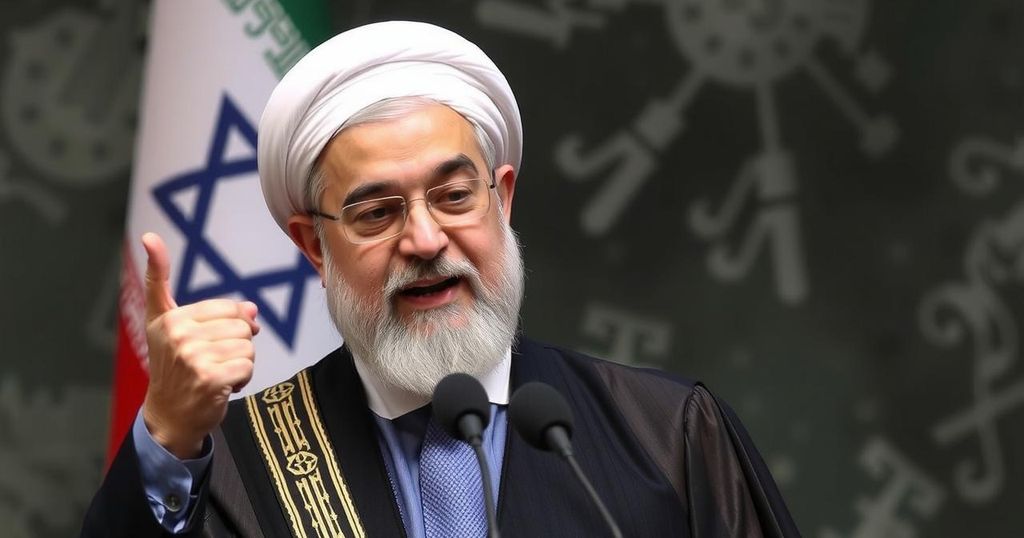Iranian Foreign Minister Abbas Aragchi warned that another Israeli attack on Iran would trigger “widespread war,” emphasizing Iran’s preparedness for conflict. He advocated for diplomatic efforts to prevent such escalation. Aragchi commented on developments in Syria, relations with Hezbollah, and the ongoing Israel-Hamas war, while also lamenting the U.S. withdrawal from the Iran nuclear deal. He expressed hope for a more peaceful global climate by 2025.
In a recent interview with China’s state broadcaster CCTV, Iranian Foreign Minister Abbas Aragchi issued a stark warning that any future attack by Israel on Iran would precipitate a “widespread war.” This assertion came during Aragchi’s inaugural visit to China since taking office, coinciding with talks alongside Chinese Foreign Minister Wang Yi. He claimed that Iran stands prepared for another Israeli onslaught, yet emphasized that the nation would persist in utilizing diplomacy to maintain relations with other Middle Eastern allies, including China.
Aragchi commented on the evolving situation in Syria, noting the rapid and unexpected rebellion that unfolded. He expressed a desire for Syria to avoid becoming a sanctuary for terrorists, insisting that its fate should be determined by its own citizens. Furthermore, the future of Iran-Syria relations would largely depend on the behavior of the new Syrian leadership under Abu Mohammad al-Julani, highlighting Iran’s intent to assist in stabilizing Syria while ensuring the security of all ethnic groups within its borders.
Regarding Hezbollah, Aragchi commended the group’s steadfast resistance against Israeli forces, asserting that despite suffering setbacks, Hezbollah’s resolve would lead to its resurgence. He contended that Israel was compelled to accept a ceasefire due to Hezbollah’s effective defense and infliction of casualties upon the Israeli military. The discussion also touched on the ongoing conflict between Israel and Hamas, where Aragchi pronounced that negotiations initiated by Israel reflect a defeat for the state that initially sought to obliterate Hamas.
As for Iran’s nuclear negotiations, Aragchi voiced regret over the United States’ withdrawal from the nuclear agreement, labeling it a “strategic mistake.” He reiterated the necessity for the resumption of discussions on this pressing matter, underscoring the importance of diplomatic dialogue. In closing, Aragchi expressed hope for a more peaceful world by 2025, wishing for a future devoid of war and injustice, advocating for a global environment rooted in fairness and the rule of law.
The Iranian Foreign Minister’s statements come amidst escalating tensions between Iran and Israel, particularly concerning military confrontations in the Middle East. Iran’s foreign policy has increasingly focused on strengthening diplomatic ties with major powers like China, particularly in response to perceived threats from Israel and the West. The situation in Syria adds complexity to this dynamic, as Iran’s stance on regional security becomes pivotal. Furthermore, the ongoing conflict between Israel and Hamas plays a significant role in shaping Iran’s regional strategy, as it seeks to position itself as a supporter of Palestinian rights. The implications of these tensions are significant for future stability in the Middle East, especially as discussions regarding Iran’s nuclear program continue to unfold against the backdrop of U.S. foreign policy.
The dialogue led by Iranian Foreign Minister Abbas Aragchi reveals the precarious balance of power in the Middle East, emphasizing Iran’s readiness to confront any aggression while simultaneously advocating for diplomatic solutions. His remarks about Syria, Hezbollah, and the Israel-Hamas conflict indicate a comprehensive approach to regional politics, underscored by a desire for a future without war. The call for a peaceful resolution reflects a broader ambition for stability and justice in international relations. As these tensions continue to evolve, The focus on diplomacy and alliances will be crucial for maintaining peace in the region.
Original Source: www.jpost.com






